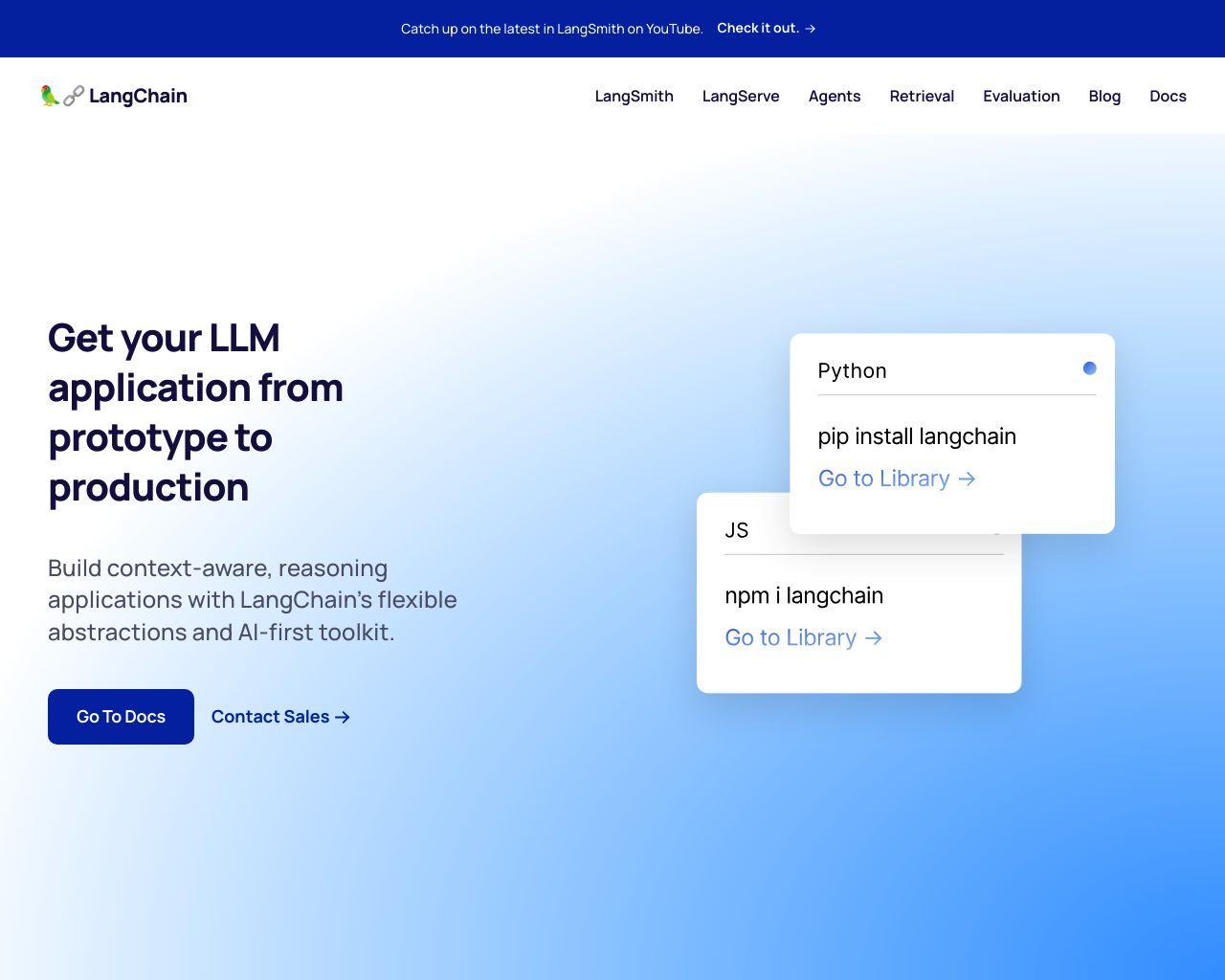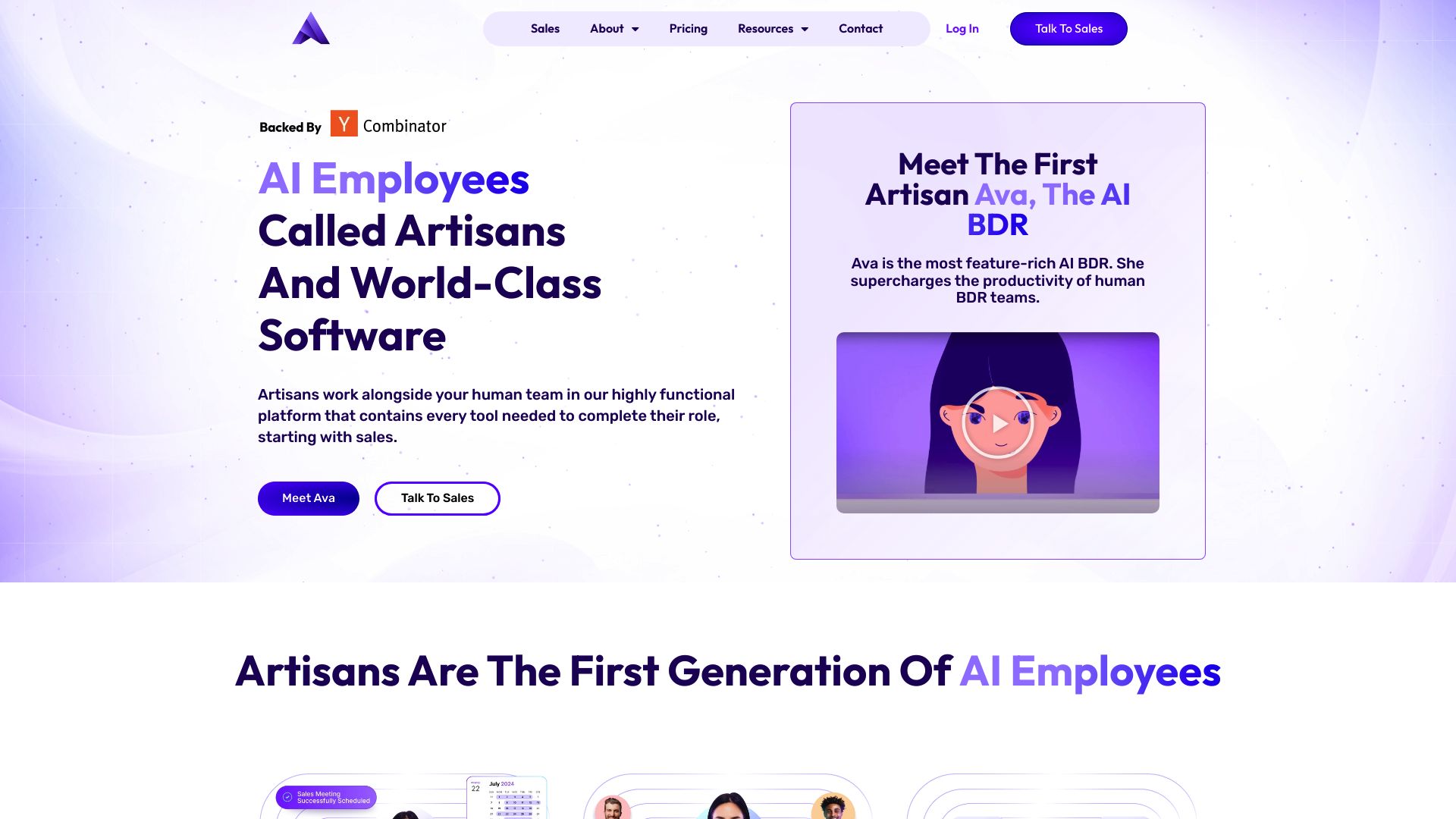LangChain vs. Artisan AI: Comparing AI Development Platforms
AI agent development platforms are revolutionizing how businesses harness artificial intelligence. This review compares LangChain vs. Artisan AI, and SmythOS — three leading solutions in this rapidly evolving space. We’ll examine each platform’s core capabilities, development approaches, and key differentiators to help you choose the right tool for your AI projects.
Whether you’re a seasoned developer seeking granular control or a business user looking for no-code solutions, you’ll gain insights into how these platforms can accelerate your AI initiatives. We’ll explore features like customization options, deployment flexibility, and integration capabilities to illuminate the strengths and limitations of each offering. By the end, you’ll have a clear understanding of which platform aligns best with your technical requirements and business goals.
LangChain Overview
LangChain equips developers with powerful tools to create sophisticated AI applications powered by large language models (LLMs). This open-source framework simplifies the entire LLM application lifecycle, from development to deployment.
At its core, LangChain offers a modular approach to building LLM-driven applications. Developers can leverage pre-built components like prompt templates, memory systems, and output parsers to rapidly prototype and iterate on their ideas. The framework’s flexibility allows for seamless integration with popular LLM providers and supports a wide range of use cases, from chatbots to document analysis.
LangChain equips developers with powerful tools to create sophisticated AI applications powered by large language models (LLMs). This open-source framework simplifies the entire LLM application lifecycle…
LangChain stands out with its comprehensive ecosystem. LangGraph enables the creation of stateful, multi-actor AI applications by modeling complex workflows as graphs. LangSmith provides robust tools for debugging, testing, and monitoring LLM applications in production environments. For deployment, LangServe streamlines the process of turning LangChain applications into production-ready APIs.


LangChain’s versatility shines through its support for various components crucial to LLM applications. These include chat models, prompt templates, output parsers, document loaders, and vector stores. The framework also emphasizes performance optimization with features like streaming support and parallel execution.
While LangChain offers a powerful toolkit, it requires a certain level of technical expertise to fully utilize. Developers familiar with Python and LLM concepts will find it easier to navigate the framework’s extensive capabilities. For those new to AI development, the learning curve may be steeper compared to more visual, no-code platforms.
Artisan AI Overview
Artisan AI provides AI-powered digital workers called Artisans designed to automate business workflows and boost productivity. These hosted AI agents work alongside human teams, requiring no infrastructure or maintenance from users.


Artisan AI focuses on no-code development, allowing non-technical users to create and deploy autonomous AI agents without programming skills. The platform’s initial product, Ava, functions as an AI sales representative that automates outbound sales processes.
Artisan AI provides AI-powered digital workers called Artisans designed to automate business workflows and boost productivity. These hosted AI agents work alongside human teams, requiring no infrastructure or maintenance from users.
Key features of Artisan AI include hosted agents for both development and production environments, memory and context retention for improved interactions, and autonomous operation capabilities. The platform also supports multi-agent collaboration and human-AI interaction, integrating artificial intelligence into existing team structures.
While Artisan AI offers powerful AI agent creation tools, it lacks some advanced features found in other platforms. The absence of a visual builder and limited customization options may restrict its appeal to more technical users. Additionally, the platform’s focus on sales and marketing applications may limit its versatility for users seeking AI solutions in other domains.
Artisan AI’s usage-based pricing model scales with the number of leads contacted per month, potentially making it cost-effective for smaller businesses but potentially expensive for high-volume users. The platform’s integration capabilities with other tools and APIs are not extensively detailed, which may be a consideration for users with complex existing tech stacks.
Feature Comparison
LangChain and Artisan AI offer distinct approaches to AI agent development, with notable differences in their core components and security features. LangChain provides a comprehensive framework for building LLM-powered applications, emphasizing flexibility and developer control. Its LangGraph component enables the creation of stateful, multi-actor AI systems, while LangSmith offers robust debugging and monitoring tools. LangChain’s open-source nature allows for extensive customization and integration with various AI models and APIs.
Artisan AI, on the other hand, focuses on providing hosted, no-code AI agents called Artisans. These digital workers are designed for easy deployment in business workflows, particularly in sales and marketing. While Artisan AI offers autonomous operation and team integration capabilities, it lacks the advanced development tools and customization options found in LangChain. Notably, Artisan AI does not provide a visual builder or extensive API integrations, limiting its appeal to more technical users or those requiring complex AI solutions.
In terms of security, LangChain emphasizes best practices and supports OAuth for API authentication, but specific features like constrained alignment and IP control are not explicitly mentioned. Artisan AI’s security measures are not detailed in the provided information, potentially raising concerns for enterprises with strict data protection requirements. Overall, LangChain offers a more comprehensive toolkit for AI development, while Artisan AI provides a simpler, more focused solution for specific business applications.
Feature Comparison Table
| LangChain | Artisan AI | SmythOS | |
|---|---|---|---|
| CORE FEATURES | |||
| Environments (Dev, Production) | ✅ | ❌ | ✅ |
| Visual Builder | ❌ | ❌ | ✅ |
| No-Code Options | ❌ | ✅ | ✅ |
| Explainability & Transparency | ✅ | ❌ | ✅ |
| Debug Tools | ✅ | ❌ | ✅ |
| Multimodal | ✅ | ❌ | ✅ |
| Multi-Agent Collaboration | ✅ | ❌ | ✅ |
| Audit Logs for Analytics | ✅ | ❌ | ✅ |
| Agent Work Scheduler | ❌ | ✅ | ✅ |
| Logs & Monitoring | ✅ | ❌ | ✅ |
| SECURITY | |||
| Constrained Alignment | ❌ | ❌ | ✅ |
| Data Encryption | ✅ | ❌ | ✅ |
| OAuth | ✅ | ❌ | ✅ |
| IP Control | ❌ | ❌ | ✅ |
| COMPONENTS | |||
| Foundation AIs | ✅ | ❌ | ✅ |
| Huggingface AIs | ✅ | ❌ | ✅ |
| Zapier APIs | ❌ | ❌ | ✅ |
| All other APIs, RPA | ✅ | ❌ | ✅ |
| Classifiers | ✅ | ❌ | ✅ |
| Logic | ✅ | ❌ | ✅ |
| Data Lakes | ❌ | ❌ | ✅ |
| DEPLOYMENT OPTIONS (EMBODIMENTS) | |||
| Deploy as API | ✅ | ❌ | ✅ |
| Deploy as Webhook | ❌ | ❌ | ✅ |
| Staging Domains | ❌ | ❌ | ✅ |
| Production Domains | ❌ | ✅ | ✅ |
| API Authentication (OAuth + Key) | ✅ | ❌ | ✅ |
| Deploy as Site Chat | ✅ | ❌ | ✅ |
| Deploy as Scheduled Agent | ❌ | ❌ | ✅ |
| Deploy as GPT | ✅ | ❌ | ✅ |
| DATA LAKE SUPPORT | |||
| Hosted Vector Database | ❌ | ❌ | ✅ |
| Sitemap Crawler | ❌ | ❌ | ✅ |
| YouTube Transcript Crawler | ❌ | ❌ | ✅ |
| URL Crawler | ❌ | ❌ | ✅ |
| PDF Support | ✅ | ❌ | ✅ |
| Word File Support | ❌ | ❌ | ✅ |
| TXT File Support | ✅ | ❌ | ✅ |
Best Alternative to LangChain and Artisan AI
SmythOS emerges as the superior alternative to LangChain and Artisan AI for agentic AI automation. Our platform combines powerful features with unparalleled ease of use, making it the ideal choice for businesses and developers seeking to harness AI’s potential.
Unlike LangChain’s complex framework and Artisan AI’s limited no-code approach, SmythOS offers a comprehensive solution that caters to users of all skill levels. Our visual drag-and-drop interface empowers users to create sophisticated AI agents without extensive coding knowledge, while still providing the flexibility for advanced customization.
SmythOS offers a comprehensive solution that caters to users of all skill levels. Our visual drag-and-drop interface empowers users to create sophisticated AI agents without extensive coding knowledge…
SmythOS excels in its extensive integration capabilities. We support a wide array of AI models, APIs, and data sources, surpassing both LangChain and Artisan AI in versatility. This allows users to seamlessly incorporate AI agents into existing workflows and systems, regardless of their complexity.
Security and scalability set SmythOS apart from its competitors. We provide robust data encryption, OAuth support, and IP control features, ensuring your AI solutions remain secure and compliant. Our platform easily scales to meet enterprise-level demands, a critical advantage over Artisan AI’s more limited scope.
With SmythOS, the possibilities are limitless. From deploying AI agents as APIs and chatbots to scheduling automated tasks, our platform supports a diverse range of use cases that neither LangChain nor Artisan AI can match. We empower users to create truly autonomous, multi-agent systems capable of tackling complex problems across industries.
Conclusion
LangChain, Artisan AI, and SmythOS each offer unique approaches to AI agent development and deployment. LangChain provides a flexible, open-source framework for building sophisticated LLM applications, appealing to developers who require granular control and extensive customization. Artisan AI focuses on hosted, no-code AI agents for business workflows, particularly in sales and marketing, making it accessible to non-technical users.
While both platforms have their strengths, SmythOS emerges as the superior choice for a wide range of users and applications. We combine the best of both worlds, offering a powerful yet user-friendly platform that caters to developers, business users, and enterprises alike. Our drag-and-drop interface and extensive integration ecosystem allow for rapid development and deployment of AI agents across multiple platforms and services.
SmythOS stands out with its comprehensive feature set, including multi-agent collaboration, advanced security measures, and versatile deployment options. Our platform supports a vast array of AI models and integrations, enabling users to create complex workflows that connect seamlessly with existing tools and data sources. This flexibility, combined with our focus on scalability and performance, makes SmythOS an ideal solution for businesses looking to harness the full potential of AI.
To experience the power and versatility of SmythOS firsthand, we invite you to create a free account and start building your own AI agents today. Discover how our platform can revolutionize your workflows, boost productivity, and drive innovation across your organization. With SmythOS, you’re not just adopting an AI tool – you’re embracing the future of work.
Last updated:
Disclaimer: The information presented in this article is for general informational purposes only and is provided as is. While we strive to keep the content up-to-date and accurate, we make no representations or warranties of any kind, express or implied, about the completeness, accuracy, reliability, suitability, or availability of the information contained in this article.
Any reliance you place on such information is strictly at your own risk. We reserve the right to make additions, deletions, or modifications to the contents of this article at any time without prior notice.
In no event will we be liable for any loss or damage including without limitation, indirect or consequential loss or damage, or any loss or damage whatsoever arising from loss of data, profits, or any other loss not specified herein arising out of, or in connection with, the use of this article.
Despite our best efforts, this article may contain oversights, errors, or omissions. If you notice any inaccuracies or have concerns about the content, please report them through our content feedback form. Your input helps us maintain the quality and reliability of our information.
